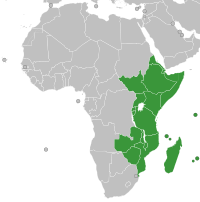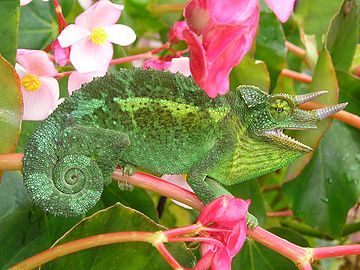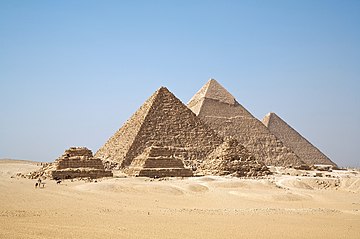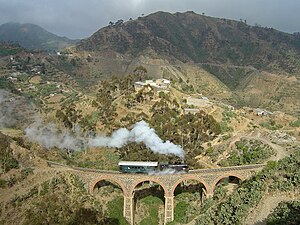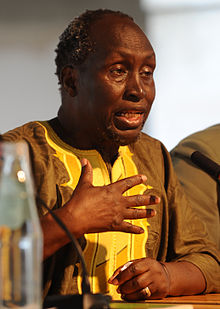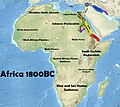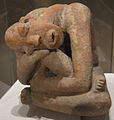


Africa is the world's second largest and second-most populous continent after Asia. At about 30.3 million km2 (11.7 million square miles) including adjacent islands, it covers 20% of Earth's land area and 6% of its total surface area. With 1.4 billion people0 as of 2021, it accounts for about 18% of the world's human population. Africa's population is the youngest amongst all the continents; the median age in 2012 was 19.7, when the worldwide median age was 30.4. Despite a wide range of natural resources, Africa is the least wealthy continent per capita and second-least wealthy by total wealth, ahead of Oceania. Scholars have attributed this to different factors including geography, climate, tribalism, colonialism, the Cold War, neocolonialism, lack of democracy, and corruption. Despite this low concentration of wealth, recent economic expansion and the large and young population make Africa an important economic market in the broader global context.
Africa straddles the equator and the prime meridian. It is the only continent to stretch from the northern temperate to the southern temperate zones. The majority of the continent and its countries are in the Northern Hemisphere, with a substantial portion and a number of countries in the Southern Hemisphere. Most of the continent lies in the tropics, except for a large part of Western Sahara, Algeria, Libya and Egypt, the northern tip of Mauritania, and the entire territories of Morocco, Ceuta, Melilla, and Tunisia which in turn are located above the tropic of Cancer, in the northern temperate zone. In the other extreme of the continent, southern Namibia, southern Botswana, great parts of South Africa, the entire territories of Lesotho and Eswatini and the southern tips of Mozambique and Madagascar are located below the tropic of Capricorn, in the southern temperate zone.
Africa is highly biodiverse; it is the continent with the largest number of megafauna species, as it was least affected by the extinction of the Pleistocene megafauna. However, Africa also is heavily affected by a wide range of environmental issues, including desertification, deforestation, water scarcity and pollution. These entrenched environmental concerns are expected to worsen as climate change impacts Africa. The UN Intergovernmental Panel on Climate Change has identified Africa as the continent most vulnerable to climate change.
The history of Africa is long, complex, and has often been under-appreciated by the global historical community. Africa, particularly Eastern Africa, is widely accepted as the place of origin of humans and the Hominidae clade (great apes). The earliest hominids and their ancestors have been dated to around 7 million years ago, including Sahelanthropus tchadensis, Australopithecus africanus, A. afarensis, Homo erectus, H. habilis and H. ergaster—the earliest Homo sapiens (modern human) remains, found in Ethiopia, South Africa, and Morocco, date to circa 233,000, 259,000, and 300,000 years ago, respectively, and Homo sapiens is believed to have originated in Africa around 350,000–260,000 years ago. Africa is also considered by anthropologists to be the most genetically diverse continent as a result of being the longest inhabited. (Full article...)
Selected article –
East Africa, also known as Eastern Africa or the East of Africa, is a region at the eastern edge of the African continent, distinguished by its geographical, historical, and cultural landscape. Defined in varying scopes, the region is recognized in the United Nations Statistics Division scheme as encompassing 18 sovereign states and 4 territories.
East Africa is acknowledged as the cradle of early modern humans, who first emerged around 200,000 years ago before spreading globally. (Full article...)Featured pictures –
Did you know (auto-generated) -

- ... that despite the support of the British authorities, the multi-racial United Tanganyika Party was unsuccessful, with the African-nationalist TANU winning a majority in the 1958–59 election?
- ... that the African zebrawood is in danger of becoming extinct?
- ... that American doctor Cory Synhorst SerVaas believed that high-lysine corn could help end hunger in Africa, end famine, and stop protein deficiency despite only being fed to livestock and poultry?
- ... that Erick Russell is the first openly gay African American elected to a statewide office in the United States?
- ... that some 5,000 white people looted a Black church for wood to burn the lynched body of John Carter, a Black man who was hanged and shot in Little Rock, Arkansas, in 1927?
- ... that Elizabeth Mburu's book African Hermeneutics seeks to bring a uniquely African approach to interpreting the Bible?
Categories
Selected biography –
Ngũgĩ wa Thiong'o (Gikuyu pronunciation: [ᵑɡoɣe wá ðiɔŋɔ]; born James Ngugi; 5 January 1938) is a Kenyan author and academic, who has been described as "East Africa's leading novelist". He began writing in English, switching to write primarily in Gikuyu. His work includes novels, plays, short stories, and essays, ranging from literary and social criticism to children's literature. He is the founder and editor of the Gikuyu-language journal Mũtĩiri. His short story The Upright Revolution: Or Why Humans Walk Upright has been translated into 100 languages.
In 1977, Ngũgĩ embarked upon a novel form of theatre in Kenya that sought to liberate the theatrical process from what he held to be "the general bourgeois education system", by encouraging spontaneity and audience participation in the performances. His project sought to "demystify" the theatrical process, and to avoid the "process of alienation [that] produces a gallery of active stars and an undifferentiated mass of grateful admirers" which, according to Ngũgĩ, encourages passivity in "ordinary people". Although his landmark play Ngaahika Ndeenda, co-written with Ngũgĩ wa Mirii, was a commercial success, it was shut down by the authoritarian Kenyan regime six weeks after its opening. (Full article...)Selected country –
 |
 |
||
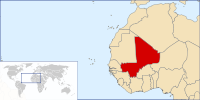
| |||
Mali, officially the Republic of Mali (French: République du Mali), is a landlocked nation in Western Africa. It is the seventh largest country in Africa. It borders Algeria on the north, Niger on the east, Burkina Faso and the Côte d'Ivoire on the south, Guinea on the south-west, and Senegal and Mauritania on the west. Formerly French Sudan, the country is named after the Mali Empire. The name of the country comes from the Bambara word for hippopotamus; the name of its capital city, Bamako comes from the Bambara word meaning "place of crocodiles".
Mali is one of the poorest countries in the world. With 65% of its land area desert or semidesert, economic activity is largely confined to the riverine area irrigated by the Niger River. About 10% of the population is nomadic and some 80% of the labor force is engaged in farming and fishing. Industrial activity is concentrated on processing farm commodities. Pottery is also practised by women whose wares are bought by dealers and are transported to markets where they are sold by traders. Mali is heavily dependent on foreign aid and vulnerable to fluctuations in world prices for cotton, its main export. (Read more...)
Selected city –
Kisumu (/kiːˈsuːmuː/ kee-SOO-moo) is the third-largest city in Kenya after the capital, Nairobi, and Mombasa. It is the second-largest city after Kampala in the Lake Victoria Basin. The city has a population of slightly over 600,000. The metro region, including Maseno and Ahero, has a population of 1,155,574 people (560,942 males, 594,609 females and 23 intersex) according to the 2019 Kenya Population and Housing Census which was conducted by the Kenya National Bureau of Statistics.
Apart from being an important political city, it is one of the premier industrial and commercial centres in Kenya. It is also an intellectual city with many PhDs per capita. The city is currently undergoing an urban rejuvenation of the downtown and lower town which includes modernizing the lake front, decongesting main streets, and making the streets pedestrian-friendly. (Full article...)In the news
- 12 February 2024 –
- Two boats collide on the Congo River near Kinshasa, Democratic Republic of the Congo; with the death toll remains unclear. (AP)
- 11 February 2024 – 2023 Africa Cup of Nations
- In association football, hosts Ivory Coast win their third Africa Cup of Nations by defeating Nigeria 2–1 in the final. Sébastien Haller scores the winning goal in the 81st minute. (The Guardian)
- 10 February 2024 – Somali civil war
- Four Emirati soldiers and a Bahraini military officer are killed, while ten other people are injured, when a soldier opens fire at a military base in Mogadishu, Somalia, before being killed in the ensuing shootout. Al-Shabaab claims responsibility. (AP)
- 10 February 2024 –
- A Eurocopter EC130 helicopter crashes near Nipton, California, United States, killing all the six people on board, including Nigerian banker Herbert Wigwe. (CBS News)
- 10 February 2024 – 2023–2024 Senegalese protests
- Violent protests occur in Senegal following an announcement by President Macky Sall that presidential elections have been delayed from February 25 to December 15. (Sky News)
- 9 February 2024 –
- At least 18 people are killed during a collision between a bus and a truck on a road in Kinshasa, Democratic Republic of the Congo. (AP)
Updated: 16:33, 14 February 2024
General images -
Africa topics
More did you know –
- ... that Dutch malacologist Adolph Cornelis van Bruggen is an expert in African land snails?
- ... that a 20‑day study reported by BirdLife International discovered 265 species of birds in Nki National Park?
- ... that Kalulu, an African boy who died in 1877, was modeled in Madame Tussauds and attended Dr. Livingstone's funeral in London?
- ... that Samuel Jackman Prescod became the first person of African descent elected to the Parliament of Barbados?
Related portals
Major Religions in Africa
North Africa
West Africa
Central Africa
East Africa
Southern Africa
Associated Wikimedia
The following Wikimedia Foundation sister projects provide more on this subject:
-
 Commons
Commons
Free media repository -
 Wikibooks
Wikibooks
Free textbooks and manuals -
 Wikidata
Wikidata
Free knowledge base -
 Wikinews
Wikinews
Free-content news -
 Wikiquote
Wikiquote
Collection of quotations -
 Wikisource
Wikisource
Free-content library -
 Wikispecies
Wikispecies
Directory of species -
 Wikiversity
Wikiversity
Free learning tools -
 Wikivoyage
Wikivoyage
Free travel guide -
 Wiktionary
Wiktionary
Dictionary and thesaurus
